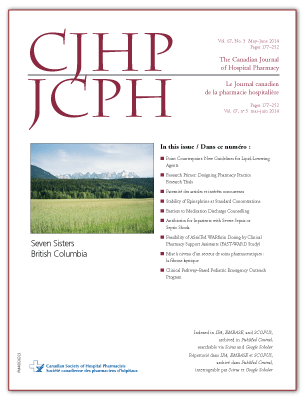Identifying Barriers to Medication Discharge Counselling by Pharmacists
DOI:
https://doi.org/10.4212/cjhp.v67i3.1357Keywords:
barriers to discharge counselling, obstacles à l’offre de conseils au moment du congéAbstract
ABSTRACT
Background: Medication errors may occur more frequently at discharge, making discharge counselling a vital facet of medication reconciliation. Discharge counselling is a recognized patient safety initiative for which pharmacists have appropriate expertise, but data are lacking about the barriers to provision of this service to adult inpatients by pharmacists.
Objectives: To determine the proportion of eligible patients who received discharge counselling, to quantify perceived barriers preventing pharmacists from performing discharge counselling, and to determine the relative frequency of barriers and associated time expenditures.
Methods: In this prospective study, 8 pharmacists working in general medicine, medical oncology, or nephrology wards of an acute care hospital completed a survey for each of the first 50 patients eligible for discharge counselling on their respective wards from June 2010 to February 2011. Patients discharged to another facility (rehabilitation, palliative care, or long-term care), those with hospital stay less than 48 h before discharge, and those whose medications were unchanged from hospital admission were ineligible.
Results: Discharge counselling was performed for 116 (29%) of the 403 eligible patients and involved a median preparation time of 25 min and median counselling time of 15 min per patient. At least one documented barrier to discharge counselling existed for 295 (73%) of the patients. Several barriers to discharge counselling occurred significantly more frequently on the general medicine and oncology wards than on the nephrology ward (p < 0.05). The most common barrier was failure to notify the pharmacist about impending patient discharge (130/313 [41%]). Time constraints existed for 130 (32%) of the patients, the most common related to clarification of prescriptions (96 [24%]), creation of a medication list (69 [17%]), and faxing of prescriptions (64 [16%]).
Conclusion: This study generated objective data about the barriers to and time constraints associated with medication discharge counselling by pharmacists. These findings should raise awareness of the challenges faced by pharmacists in busy hospital positions and may support avenues of change for their hospital discharge counselling programs.
RÉSUMÉ
Contexte : Les erreurs de médication peuvent être plus fréquentes lors du congé, ce qui fait de l’offre de conseils au moment du congé un élément essentiel du bilan comparatif des médicaments. L’offre de conseils au moment du congé est un service dont la valeur quant à la sécurité des patients est reconnue et pour lequel les pharmaciens possèdent l’expertise nécessaire. Toutefois il y a trop peu de données sur les éléments qui font obstacle à l’offre de ce service aux patients hospitalisés par les pharmaciens.
Objectifs : Définir quelle est la proportion de patients admissibles ayant obtenu des conseils au moment du congé, quantifier les éléments perçus comme des obstacles qui empêchent les pharmaciens d’offrir ce service et déterminer la fréquence relative des obstacles ainsi que les contraintes de temps qui y sont associées.
Méthodes : Dans cette étude prospective, huit pharmaciens travaillant aux services de médecine générale, d’oncologie médicale ou de néphrologie dans un hôpital de soins de courte durée ont rempli un questionnaire pour chacun des 50 premiers patients admissibles à une offre de conseils au moment où ceux-ci prenaient congé de leurs services respectifs entre juin 2010 et février 2011. Les patients transférés dans un autre établissement (réadaptation, soins palliatifs ou soins de longue durée), ceux dont le séjour à l’hôpital était de moins de 48 h avant le congé et ceux dont la médication est demeurée inchangée pendant leur séjour à l’hôpital n’étaient pas admissibles.
Résultats : Un service de conseils au moment du congé a été fourni à 116 (29 %) des 403 patients admissibles. Il nécessitait en moyenne un temps de préparation de 25 minutes et un temps d’offre de conseils de 15 minutes par patient. Au moins un obstacle à l’offre de conseils au moment du congé a été relevé pour 295 (73 %) patients. De multiples obstacles à l’offre de conseils étaient beaucoup plus fréquents aux services de médecine générale et d’oncologie qu’à celui de néphrologie (p < 0,05). Le plus fréquent était que l’on négligeait d’informer le pharmacien du congé imminent du patient (130/313 [41 %]). Des contraintes de temps ont été relevées pour 130 (32 %) patients, les raisons les plus courantes étant reliées à la clarification des ordonnances (96 [24 %]), à la création d’une liste de médicaments (69 [17 %]) et à la télécopie d’ordonnances (64 [16 %]).
Conclusion : Cette étude a produit des données objectives sur les éléments qui font obstacle à la prestation par les pharmaciens de conseils en matière de médicament au moment du congé et sur les restrictions de temps qui y sont associées. Ces résultats devraient mieux faire connaître les problèmes auxquels font face les pharmaciens hospitaliers affairés et ils peuvent fournir des pistes de changement à leurs programmes de prestation de conseils au moment du congé.
Downloads
Published
Issue
Section
License
Copyright © Canadian Society of Healthcare-Systems Pharmacy.
After publication of a manuscript in the CJHP, the authors of the manuscript must obtain written permission from the CSHP (publications@cshp.ca) before reproducing any text, figures, tables, or illustrations from the work in future works of their own. If a submitted manuscript is declined for publication in the CJHP, all said rights shall revert to the authors. Please note that any forms (e.g., preprinted orders and patient intake forms) used by a specific hospital or other health care facility and included as illustrative material with a manuscript are exempt from this copyright transfer. The CJHP will require a letter from the hospital or health care facility granting permission to publish the document(s).










